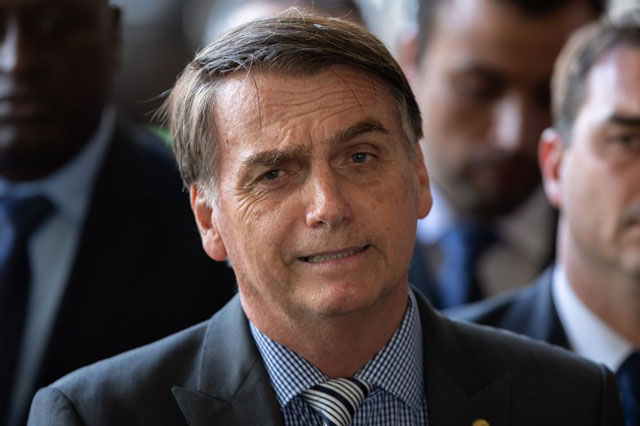
Rio de Janeiro, Brazil | AFP | Brazil is about to experience its moment of truth with its new president, Jair Bolsonaro, who takes power on Tuesday as an untested leader vowing a crackdown on crime and corruption and ideological opposition to the left.
The 63-year-old former paratrooper, long an obscure politician, won electoral legitimacy with a comfortable win in October, triumphing in a country left bitter and demoralized by a record recession, graft exposed at the highest levels, and a soaring murder rate.
Bolsonaro and his far-right policies seduced where a divided left and a marginalized center-right floundered. His ultraconservative Social Liberal Party scooped up 52 seats in the 513-member Congress, making it the second-biggest group in the fractured legislature.
To ensure he can govern, Bolsonaro will rely on deputies belonging to key lobbies rallying to his party to pass legislation. They include those defending the interests of agribusiness, burgeoning evangelical churches, and pro-gun groups.
Initially at least, he will also enjoy the support of investors, hoping he can see through fiscal reforms to drag Brazil out of its unsustainable accumulation of debt.
– ‘A lot of unknowns’ –
The task before him is formidable.
To overhaul the over-generous pension system, for instance, his economic team that views this as a priority is certain to butt heads with Bolsonaro allies who do not want to upset voters.
Bolsonaro’s high-profile embrace of Israel has alarmed the country’s big meat exporters which fear losing lucrative Arab markets. An announcement of moving Brazil’s embassy to Jerusalem was hastily rowed back to “not decided yet.”
The president-elect has warmly welcomed Israeli Prime Minister Benjamin Netanyahu ahead of his inauguration. Netanyahu said Sunday in Rio de Janeiro that Bolsonaro had told him the Brazilian embassy move was a question of “when” rather than “if.”
“We are on the eve of the president-elect taking office and there are still a lot of unknowns about his government,” said Rogerio Bastos Arantes, a political science professor at the University of Sao Paulo.
A few of the concrete policy moves to come are Brazil’s withdrawal from a United Nations global pact on migration, an end to Cuba’s sending doctors to poor parts of Brazil, and an imminent decree making gun ownership far easier.
These appeal to Bolsonaro’s base, which wants to see an end to Brazil’s friendly-to-all-countries policy reinforced during the 2003-2016 period of center-left rule under the Workers Party.
Bolsonaro, criticized during the electoral campaign for his long track record of disparaging women, blacks and gays, has promised to be a leader for all of Brazil’s 210 million inhabitants, though there was no sign yet of any unifying agenda.
Bastos Arantes said the country could face a “crisis of governability” if Bolsonaro does not quickly make good on that promise.
“Bolsonaro has to tell society what positive things he wants to do, not just negative ones,” the analyst said. “It’s very difficult to govern and deal with institutions on the basis of campaign rhetoric.”
– Avoiding scrutiny –
Observers also noted Bolsonaro’s stated intention to deliver his messages directly to Brazilians via social media, which he is as big a user of as US President Donald Trump.
“New technologies allow a direct relationship between a voter and his representatives,” the president-elect told the Supreme Court when his upcoming mandate was validated.
But such tactics, which would skip around checks and balances provided from direct questioning by journalists, could permit Bolsonaro to create narratives around external enemies in an effort to concentrate more power, Bastos Arantes said.
Already, Bolsonaro has pledged to do all he can to challenge the left-wing governments of Cuba and Venezuela.
“Inventing an external enemy to reinforce domestic control is a well-known formula,” Batsos Arantes said.
– Ex-military ministers –
Openly nostalgic for Brazil’s 1964-1985 military dictatorship, Bolsonaro has formed a government with a third of ministries going to ex-military men.
But the team also includes Paulo Guedes, a US-trained economist determined to bring in free-market dogma, and a formerly mid-ranking foreign ministry employee, Ernesto Araujo, as foreign minister. A star anti-corruption judge, Sergio Moro, has been named justice minister.
The government, much of it inexperienced, will use its first 100 days in office to identify challenges and propose solutions.
That period will be revelatory for the sort of stewardship Brazil will encounter under President Bolsonaro.
 The Independent Uganda: You get the Truth we Pay the Price
The Independent Uganda: You get the Truth we Pay the Price



